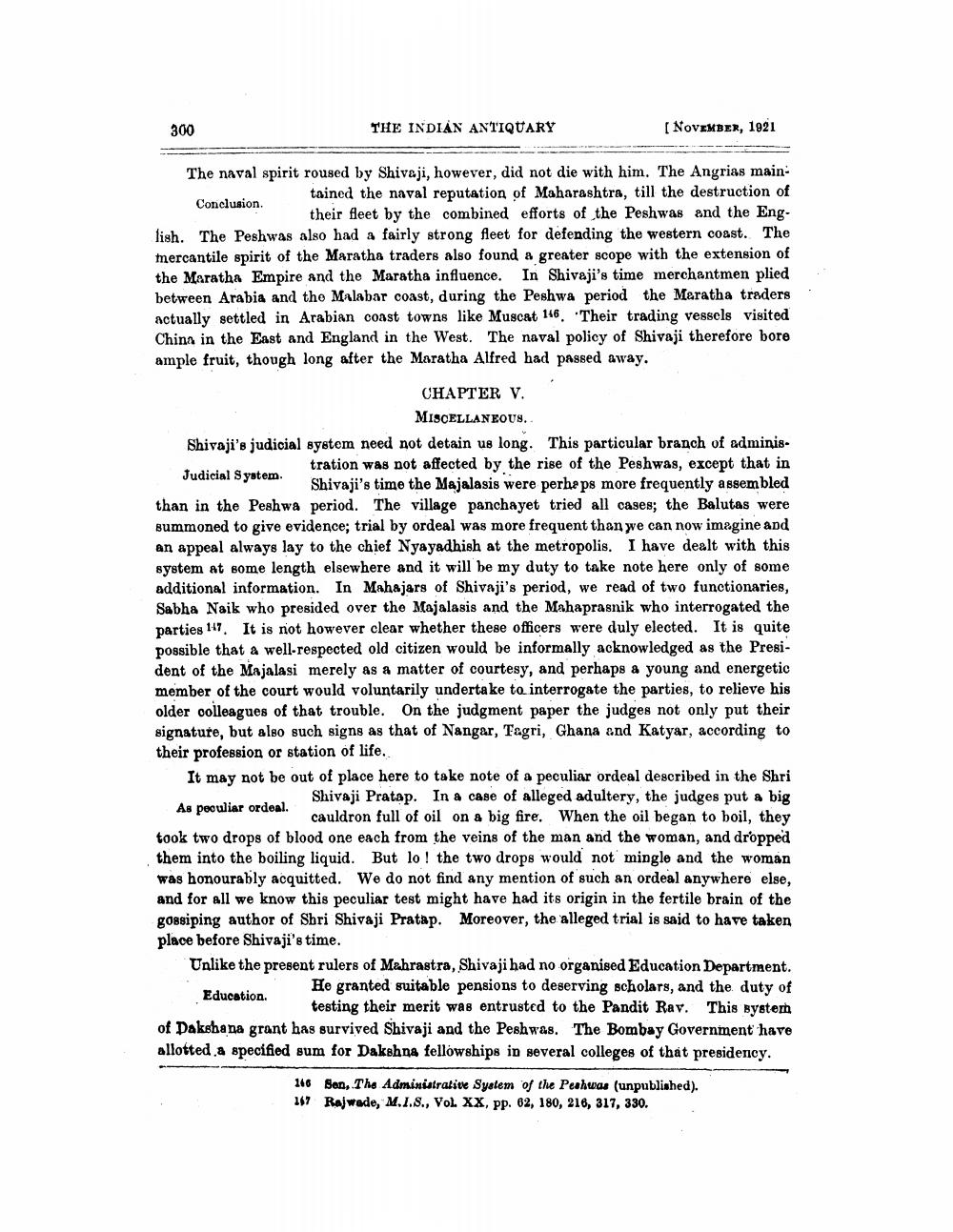________________
300
THE INDIAN ANTIQUARY
[NOVEMBER, 1921
Conclusion.
The naval spirit roused by Shivaji, however, did not die with him. The Angrias maintained the naval reputation of Maharashtra, till the destruction of their fleet by the combined efforts of the Peshwas and the English. The Peshwas also had a fairly strong fleet for defending the western coast. The mercantile spirit of the Maratha traders also found a greater scope with the extension of the Maratha Empire and the Maratha influence. In Shivaji's time merchantmen plied between Arabia and the Malabar coast, during the Peshwa period the Maratha traders actually settled in Arabian coast towns like Muscat 146. Their trading vessels visited China in the East and England in the West. The naval policy of Shivaji therefore bore ample fruit, though long after the Maratha Alfred had passed away.
CHAPTER V. MISCELLANEOUS.
Shivaji's judicial system need not detain us long. This particular branch of administration was not affected by the rise of the Peshwas, except that in Judicial System. Shivaji's time the Majalasis were perhaps more frequently assembled than in the Peshwa period. The village panchayet tried all cases; the Balutas were summoned to give evidence; trial by ordeal was more frequent than we can now imagine and an appeal always lay to the chief Nyayadhish at the metropolis. I have dealt with this system at some length elsewhere and it will be my duty to take note here only of some additional information. In Mahajars of Shivaji's period, we read of two functionaries, Sabha Naik who presided over the Majalasis and the Mahaprasnik who interrogated the parties 17. It is not however clear whether these officers were duly elected. It is quite possible that a well-respected old citizen would be informally acknowledged as the President of the Majalasi merely as a matter of courtesy, and perhaps a young and energetic member of the court would voluntarily undertake to interrogate the parties, to relieve his older colleagues of that trouble. On the judgment paper the judges not only put their signature, but also such signs as that of Nangar, Tagri, Ghana and Katyar, according to their profession or station of life.
As peculiar ordeal.
It may not be out of place here to take note of a peculiar ordeal described in the Shri Shivaji Pratap. In a case of alleged adultery, the judges put a big cauldron full of oil on a big fire. When the oil began to boil, they took two drops of blood one each from the veins of the man and the woman, and dropped them into the boiling liquid. But lo! the two drops would not mingle and the woman was honourably acquitted. We do not find any mention of such an ordeal anywhere else, and for all we know this peculiar test might have had its origin in the fertile brain of the gossiping author of Shri Shivaji Pratap. Moreover, the alleged trial is said to have taken place before Shivaji's time.
Education.
Unlike the present rulers of Mahrastra, Shivaji had no organised Education Department. He granted suitable pensions to deserving scholars, and the duty of testing their merit was entrusted to the Pandit Rav. This system of Dakshana grant has survived Shivaji and the Peshwas. The Bombay Government have allotted a specified sum for Dakshna fellowships in several colleges of that presidency.
146 Sen, The Administrative System of the Peshwas (unpublished). 167 Rajwade, M.I.S., Vol. XX, pp. 62, 180, 216, 317, 330.




